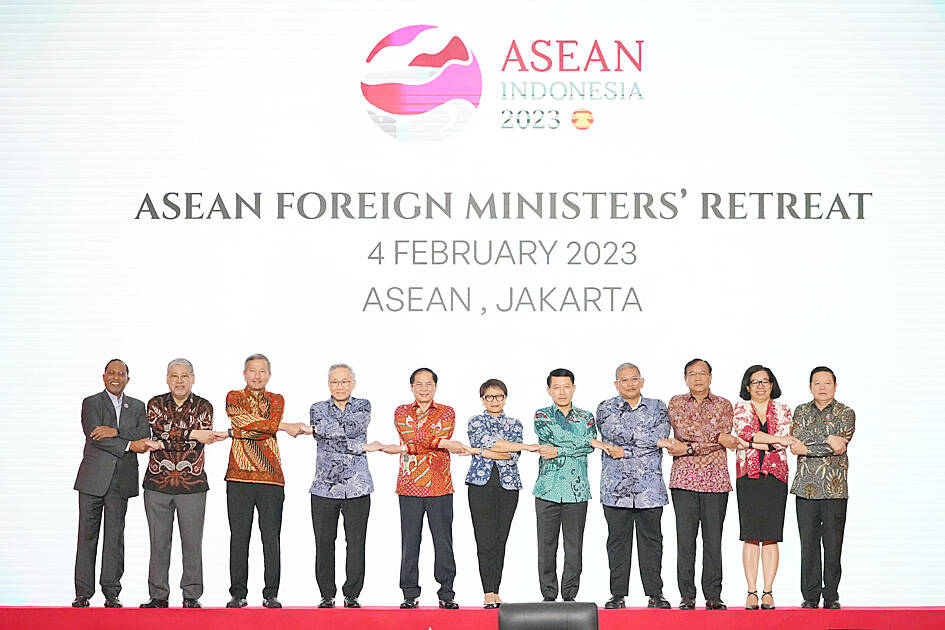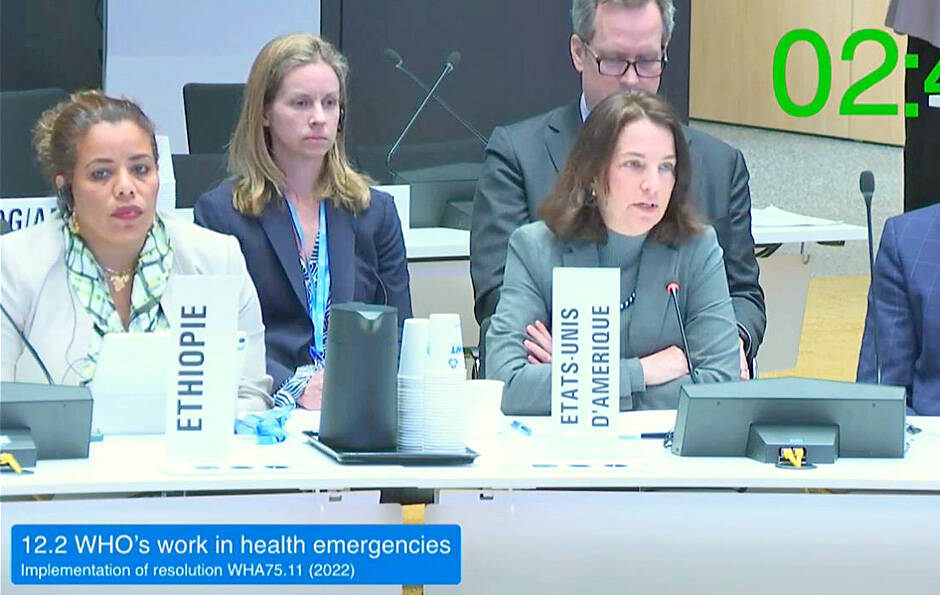The Ministry of Foreign Affairs yesterday welcomed a joint statement by ASEAN leaders voicing concerns that the situation across the Taiwan Strait could affect regional stability.
The statement was issued after the ASEAN Foreign Ministers’ Retreat ended on Saturday in Jakarta. It was the first major meeting since Indonesia assumed chairmanship of ASEAN this year.
Attendees of the meeting reiterated their determination to promote “sustainable peace, security, stability, and prosperity within and beyond the region,” the statement said.

Photo: AP
They expressed concerns about developments across the Taiwan Strait and their “implications on regional stability,” the statement said.
The cross-strait situation “could lead to miscalculation, serious confrontation, open conflicts, and unpredictable consequences,” it said.
ASEAN is ready to “play a constructive role in facilitating peaceful dialogue between all parties ... to de-escalate tension, to safeguard peace, security and development in the area adjacent to our region,” it said.

Photo: Screen grab from the WHO’s Web site
The group voiced similar concerns after the ASEAN Foreign Ministerial Meetings in August last year, the ministry said in a news release yesterday.
That meeting was held as the Chinese military was conducting live-fire drills around Taiwan after then-US House of Representatives speaker Nancy Pelosi visited Taipei.
At the time, ASEAN called for “maximum restraint, refrain from provocative action.”
The ministry called on ASEAN member states to continue to support democratic Taiwan and pay attention to cross-strait peace and stability.
Taiwan is willing to deepen cooperation with ASEAN based on the solid foundation of the New Southbound Policy to protect the rules-based international order and facilitate peace, stability and prosperity in the Indo-Pacific region, it said.
Taiwan hopes that the summits and meetings held under the leadership of Indonesia are successful, it added.
In other news, Japan, Nauru and the US have voiced support for Taiwan at the 152nd session of the WHO Executive Board, which began on Monday last week and ends tomorrow.
“We urge WHO to be fully inclusive of all partners, including Taiwan, and support Taiwan’s participation as an observer to the WHA [World Health Organization] and in the work of WHO,” Bathsheba Nell Crocker, US ambassador to the UN in Geneva, Switzerland, said on Saturday.
Japanese Assistant Minister for Global Health and Welfare Eiji Hinoshita praised Taiwan’s success in tackling COVID-19, calling on the WHO not to “make any geographical vacuums which are created by leaving specific regions behind in addressing global health issues.”
Nauru said in a statement that omitting countries such as Taiwan from WHO projects “creates a gap that undermines global preparedness and response to health emergencies.”

INVESTIGATION: The case is the latest instance of a DPP figure being implicated in an espionage network accused of allegedly leaking information to Chinese intelligence Democratic Progressive Party (DPP) member Ho Jen-chieh (何仁傑) was detained and held incommunicado yesterday on suspicion of spying for China during his tenure as assistant to then-minister of foreign affairs Joseph Wu (吳釗燮). The Taipei District Prosecutors’ Office said Ho was implicated during its investigation into alleged spying activities by former Presidential Office consultant Wu Shang-yu (吳尚雨). Prosecutors said there is reason to believe Ho breached the National Security Act (國家安全法) by leaking classified Ministry of Foreign Affairs information to Chinese intelligence. Following interrogation, prosecutors petitioned the Taipei District Court to detain Ho, citing concerns over potential collusion or tampering of evidence. The

‘FORM OF PROTEST’: The German Institute Taipei said it was ‘shocked’ to see Nazi symbolism used in connection with political aims as it condemned the incident Sung Chien-liang (宋建樑), who led efforts to recall Democratic Progressive Party (DPP) Legislator Lee Kun-cheng (李坤城), was released on bail of NT$80,000 yesterday amid an outcry over a Nazi armband he wore to questioning the night before. Sung arrived at the New Taipei City District Prosecutors’ Office for questioning in a recall petition forgery case on Tuesday night wearing a red armband bearing a swastika, carrying a copy of Adolf Hitler’s Mein Kampf and giving a Nazi salute. Sung left the building at 1:15am without the armband and apparently covering the book with a coat. This is a serious international scandal and Chinese

Seventy percent of middle and elementary schools now conduct English classes entirely in English, the Ministry of Education said, as it encourages schools nationwide to adopt this practice Minister of Education (MOE) Cheng Ying-yao (鄭英耀) is scheduled to present a report on the government’s bilingual education policy to the Legislative Yuan’s Education and Culture Committee today. The report would outline strategies aimed at expanding access to education, reducing regional disparities and improving talent cultivation. Implementation of bilingual education policies has varied across local governments, occasionally drawing public criticism. For example, some schools have required teachers of non-English subjects to pass English proficiency

TRADE: The premier pledged safeguards on ‘Made in Taiwan’ labeling, anti-dumping measures and stricter export controls to strengthen its position in trade talks Products labeled “made in Taiwan” must be genuinely made in Taiwan, Premier Cho Jung-tai (卓榮泰) said yesterday, vowing to enforce strict safeguards against “origin laundering” and initiate anti-dumping investigations to prevent China dumping its products in Taiwan. Cho made the remarks in a discussion session with representatives from industries in Kaohsiung. In response to the US government’s recent announcement of “reciprocal” tariffs on its trading partners, President William Lai (賴清德) and Cho last week began a series of consultations with industry leaders nationwide to gather feedback and address concerns. Taiwanese and US officials held a videoconference on Friday evening to discuss the